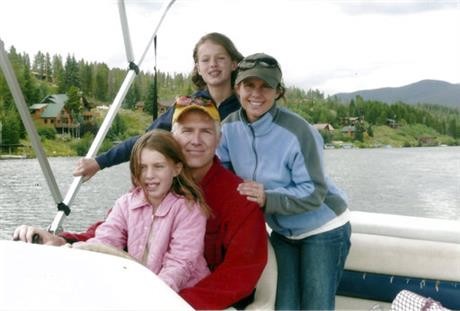Disarmingly warm Gorsuch loves ‘cold neutrality’ of law
It’s poker night in a row house on Cranham Street, Oxford, England, and Neil Gorsuch, studying for yet another degree, is feeling down. His housemates decide that what Gorsuch needs is a girlfriend.
Accounts differ on whether it was a dare, goading or a gentle prod, but Gorsuch phones a woman he’d clicked with during a school dinner more than a year earlier — and she doesn’t remember him.
Awkward.
That 1994 phone call may be one of the few times that Gorsuch, a federal judge nominated for the Supreme Court by President Donald Trump, didn’t immediately stand out from the crowd. Louise Burletson agreed to go out with him anyway, and ultimately married the man Trump now describes as “perfect in almost every way” for the high court.
Gorsuch, whose Senate confirmation hearings begin Monday, is roundly described by colleagues and friends as a silver-haired combination of wicked smarts, down-to-earth modesty, disarming warmth and careful deliberation.
Critics largely agree. But even so, they don’t think he belongs on the court, believing him too quick to side with conservative and business interests at the expense of working Americans and the poor.
At age 49, Gorsuch already has marked his 10th anniversary as an appellate judge in Colorado, styling himself in the mold of the late Justice Antonin Scalia, the conservative powerhouse whom he would replace.
In his writings and lectures , Gorsuch offers himself as a “workaday judge,” one wearing “honest, unadorned black polyester” robes from a uniform supply store. (Those robes perhaps hiding coffee stains on the shirt underneath, Gorsuch admits.)
Self-deprecation is not just his shtick.
Gorsuch never mentioned to his best friend, Michael Trent, that he’d been added to the list of prospective justices Trump released last fall.
Superstitious about his prospects for joining the court, the Denver-based judge put off decisions about where his family would live in Washington and his two teenage girls would attend school, telling Trent, “I’m not there yet.
___
Who is Neil Gorsuch?
He’s the dad whose standing birthday present from his family is an agreement to watch a Western with him.
He’s the sports nut who jogs with his law clerks, teaches them the Zen of fly fishing and waits at the top of the ski slopes to see which of them he’ll need to help up after a fall.
He’s the friend whose buddies remember his spot-on impressions of Jimmy Stewart and John McLaughlin, the conservative commentator who pioneered TV political talkfests.
He’s the writerly judge who crafts his opinions with uncommon clarity , going so far as to diagram a sentence in one ruling.
“He’s someone who knows the names of the security guards at the courthouse and gets to know who their families are,” says former law clerk Theresa Wardon.
“He’s the kind of person who talks about law for fun,” says Joshua Goodbaum, another former clerk.
“He’s a glass-half-full kind of guy,” says Luis Reyes, a former colleague at the Justice Department.
He’s also the judge who wrote that a university’s six-month sick leave policy was “more than sufficient” for a cancer patient who sought more time off when a flu epidemic hit and she worried about how an infection might affect her weakened immune system.
Says Ilyse Hogue, president of NARAL Pro-Choice America: “I’m hearing he’s a really nice guy. That’s way too low a bar for a jurist on the highest court in the land.”
___
From his boyhood in Colorado, Gorsuch was a dutiful student, “always on the brainy side,” says younger brother J.J. Gorsuch. Theirs was a typical Western childhood, filled with family outings to go hiking, skiing and fishing.
Even Gorsuch’s childhood mischief tended toward the intellectual — he once read a book about gambling and put it to use by starting a basement casino for neighborhood kids.
Flash forward a few years: Gorsuch is in a coat and tie at Georgetown Prep, an all-boys school in suburban Washington. President Ronald Reagan had chosen his mother, Anne Gorsuch, a state legislator, to lead the Environmental Protection Agency, and she brought her three children east. Her husband stayed in Colorado as their marriage dissolved.
Gorsuch’s friends at the Jesuit school included Bill Hughes, whose father was a Democratic congressman from New Jersey, and Trent, his father the deputy transportation secretary. Each felt pressure to protect his family name.
“We were all very cognizant of the responsibility we had to our parents not to screw up,” remembers Hughes.
With politics in the air, Gorsuch inhaled deeply. He led schoolmates to the Capitol to attend a rally for insurgents opposing the Soviet Army in Afghanistan. His yearbook entry includes a joking reference to founding the “Fascism Forever” club, a dig at left-leaning teachers. Most significant, he watched his mother’s stormy 22-month tenure at EPA end with her forced resignation after being cited for contempt of Congress for refusing to turn over subpoenaed documents.
Anne Burford, by then remarried, recalled her son telling her: “You only did what the president ordered. Why are you quitting? You raised me not to be a quitter.”
After high school, Gorsuch embarked on a grueling, decade-long tutorial: In and out of Columbia in three years, still finding time to co-found a conservative newspaper and magazine. On to Harvard Law without a break. Off to Oxford to study legal philosophy, ducking out in the middle for a clerkship with Supreme Court Justices Byron White and Anthony Kennedy.
“I kept asking him, ‘When are you going to stop doing all this and get a real job?'” recalls Trent.
___
Finally, in 1995, it was time for that real job.
Gorsuch passed up the big firms to go with a start-up, diving into “the muck and mess of real-life litigation,” representing both plaintiffs and defendants, recalls former partner Mark Hansen.
“He decided to go someplace where he’d get more experience, faster, and he could help build something,” says Hansen. He credits Gorsuch with a dogged work ethic — billing an average 2,400-3,000 hours a year as partner — but also an easygoing temperament.
Stuck in cramped working quarters during an out-of-town trial, Gorsuch gamely nicknamed the space “Das Boot,” after the movie about a German submarine.
After a decade in private practice, Gorsuch in 2005 joined the Justice Department, where he was deeply involved in lawsuits and legislative proposals supporting the George W. Bush administration’s warrantless wiretapping program and its treatment of detainees at Guantanamo Bay and elsewhere.
Justice colleague Reyes saw in Gorsuch “the makings of a great judge” and a “remarkably good human being.” When Reyes’ father was gravely ill, it was Gorsuch who encouraged him to take time off.
From Justice, Gorsuch made a quick leap to the judiciary when Bush nominated him in 2006 for the 10th Circuit, a lifetime appointment and chance to get back to Colorado.
Gorsuch struggled with the offer.
Trent recalls him saying, “I’m young. This is such a wonderful opportunity, but I don’t know that I’m at that point in my life where I should consider this.”
___
He took the job.
After a decade of advocacy, the 39-year-old Gorsuch promised to set aside personal political views in favor of the “cold neutrality of an impartial judge,” citing the words of political theorist Edmund Burke.
“I resist pigeon holes,” Gorsuch testified at his confirmation hearing. “Pigeon holes ignore gray areas in the law.”
Former law clerk Janie Nitze remembers Gorsuch as adamant his chambers be “all about the rule of law” and “not a place for the personal preferences of the judge.”
Over the next decade, Gorsuch became known for his plainly written opinions and his approach as a “textualist” who sticks within the boundaries of established law and precedent.

But some of Gorsuch’s rulings and outside writings lead critics to say he tends to favor powerful interests over ordinary Americans.
They cite the case of a truck driver fired for leaving his trailer of meat on the side of an Illinois road after breaking down on a frigid night in 2009, fearing he’d freeze to death.
Gorsuch dissented from a ruling in favor of Alphonse Maddin’s reinstatement, writing: “It might be fair to ask whether TransAm’s decision was a wise or kind one. But it’s not our job to answer questions like that.”
On Election Night 2016, Gorsuch and Trent texted back and forth as Trump’s upset victory became increasingly likely. Although he was on Trump’s list of potential justices, Gorsuch doubted he had much of a shot since he had no inside connections with the Trump campaign.
But Trump’s team was drawn to Gorsuch’s clear writings and restrained legal approach.
It’s those same writings that led detractors to conclude Gorsuch would be a certain conservative vote in the high-profile cases where justices tend to divide on ideological grounds.
As he was introduced to the nation, Gorsuch said it’s not his job to engineer happy endings:
“A judge who likes every outcome he reaches is very likely a bad judge, stretching for results he prefers rather than those the law demands.”





